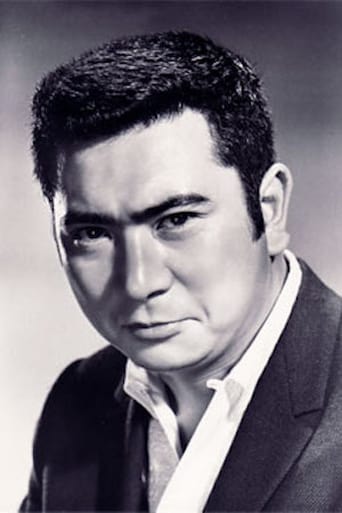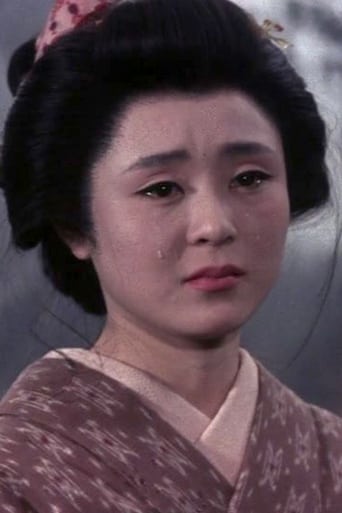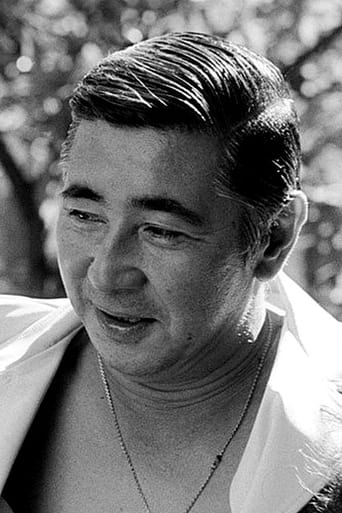ThedevilChoose
When a movie has you begging for it to end not even half way through it's pure crap. We've all seen this movie and this characters millions of times, nothing new in it. Don't waste your time.
Aiden Melton
The storyline feels a little thin and moth-eaten in parts but this sequel is plenty of fun.
kluseba
Zatoichi and the Chest of Gold is one of the most entertaining entries in the franchise and on the same level as the strong predecessor Zatoichi on the Road. The movie starts with Zatoichi paying respects at the grave of a man he wrongfully killed two years ago. He meets some local villagers who are celebrating the fact that they are finally able to pay their tax debts to the local intendant. However, the chest with the money from eighteen different villagers gets stolen by some ruthless ronin. Since Zatoichi was seen near the scene of the crime, he gets accused of a crime he didn't commit and swears to find the real culprit in order to clear his name. Zatoichi starts his investigation by meeting a bandit who has found refuge on a mountain after he was chased away by political opponents. Zatoichi finds out that some of the bandit's men went rogue but realizes the bandit himself is innocent. They team up in order to clear their names, fight the local intendant and his associates who are behind the theft and conspiracy and help the upset villagers.There are several reasons why this film stands out. First of all, it has a quite fast pace and doesn't waste any time with a lengthy introduction or an overlong conclusion. No scene is unnecessary and no minute is wasted in this dynamic film. Secondly, the movie has a sociocritical component as it portrays how abusive politicians are only interested in their own objectives while poor villagers are constantly tricked and tortured. Thirdly, the movie includes some straightforward humor for the first time in the franchise. In one scene, Zatoichi surprises a beautiful woman in a hot spring and then coincidentally discovers two young perverted men who were peeping through a window in the roof. In another scene, an ugly prostitute offers her services to Zatoichi who remains polite aside of commenting that the woman smells like a field of pumpkin flowers until he realizes that the prostitute demands a hefty sum for a massage which leads him to suggest her she should take a bath from time to time.In the end, Zatoichi and the Chest of Gold is an entertaining, fast-paced and refreshingly vivid entry in the franchise and you won't see the film's eighty-three astonishing minutes pass. Aside of the refreshing new elements, the fight sequences are great to watch as usual and especially the final duel between the blind masseur and a man on horseback using a whip is quite memorable. Fans of martial arts films can't get around this energetic film that has aged rather well without losing its connection to rural Japan in the mid-nineteenth century.
mevmijaumau
Zatoichi and the Chest of Gold is, stylistically, a huge step up from the previous entries of the series. New director Kazuo Ikehiro revitalizes the shtick a bit and adds bloody violence, humor, faster pace and even some skin in a light-hearted onsen bath scene. The film begins with a James Bond-styled opening sequence, which sees Ichi slaughtering people in front of a black back-drop. This pretty much completely summarizes his adventures; walking in darkness and kicking ass.The story, unfortunately, isn't a treasure hunt adventure as you'd expect from the title, but rather concerns Zatoichi pursuing thieving government officials to clear his name of stealing a chest full of a village's tax money. There's some more past continuity creeping up in the form of Ichi visiting the grave of a man he'd killed before, but luckily the film isn't too dependent on its predecessors. Unfortunately, the plot does get kinda convoluted at some point in typical Zatoichi fashion, and I'm not really a fan of the lengthy mountain sequence where Zatoichi converses with a respected master, because it just seems like a long detour from the rest of the storyline, which is crowded enough on its own right.However, outside of some obligatory night scenes shot in pitch darkness, the movie excels in the technical field. The colors and shot compositions are fresh and the way the final showdown between Zatoichi and the remaining nemesis (played by Katsu's brother Tomisaburo Wakayama) is staged is beautiful and the fight itself is also pretty intense even though it's obvious to everyone who the winner will be.Highlight of the movie: Probably that final duel.
CCharlesIC
This sixth installment is another great, and unique, entry in the series. In the opening scene we see a montage of how many of Ichi's days unfold: walking in total darkness he is suddenly surrounded by men with drawn swords. A minute later, and with no words spoken, he continues walking into the darkness blowing his masseurs whistle - as those men bleed to death on the roadside. This happens again - and again. Such is the life of this yazuka. A masterful bit of cinematography & choreography under the direction of Ikehiro. Ikehiro would direct two more Zatoichi films.This is also the first film not to have a romantic interest for Ichi. Since the passing of his first love, Otane, in the 4th film; Ichi's heart seems no longer available to fall in love. In the early films, women were drawn to him because of his compassion for people, gentle humor, and acute moral compass. Toss in his self-sufficiency as a masseur, a keen-eared gambler, and lest we forget - swordsman extraordinaire; of course women felt they would be well cared for if he would accept them. However love seems to be only another word for curse where this zato is concerned. In the 3rd film, young Yayoi revealed she had had a crush on the slightly older Ichi as he trained under her even older brother. He seems to have harbored a crush on her too, and she proposes marriage to Ichi! Then at the finale, Ichi has to duel his former Sensai, Yayoi's brother. Both Yayoi and Ichi are emotionally crushed when the Sensei drops. Ichi has reinforced his image as a killer - not a lover - irreparably. Then in the fifth film a young and highly immature woman, Mitsu, clung to him more out of gratitude for her safety than love and not only was a generational gap revealed; but Ichi seems to have realized how rare and unlikely Yayoi and Otane's affections had been. The only romantic possibility in "The Chest of Gold" is dead Kichizo's sister, whom Ichi treats practically as a servant. What he does get, in a series first, is a "sensual massage" by a woman who had no interest in being "repaid in kind". The first instance of adult humor in the Zato series. Other firsts in this film are: an honorable boss - whom Ichi respects; a dishonest government official - in cahoots with yet another selfish boss; a village cooperative system - which amasses 1000 ryo after 3 bad years of crops(!); and a whip-wielding ronin (Katsu's real-life brother, Tomisaburo Wakayama!!) - Zatoichi briefly seems helpless against this new weapon. Overall, this is a solid entry in a mythic Chambara series. If possible, get it as part of the Criterion Collection's 25 film set.
MartinHafer
This film sure started off well. Instead of the usual credits, these were the coolest ones yet. Against a black background, Zatôichi smokes a cigarette as periodically evil men attack him and he dispatches them like flies--and continues smoking like he's the toughest guy in town!When the film itself begins, Zatôichi comes upon a humble village where they are having a celebration. It seems that after three years of drought, the villagers had a good harvest and can finally pay off the tax bill. However, when the money is stolen, the villagers stupidly believe the stranger in town (Zatôichi) did it. Considering that he's blind and doesn't leave after the theft, it sure seems ridiculous to blame him. Further, after the townsfolk beat him up, it's also very surprising that our hero would agree to help them find their stolen funds.Zatôichi assumes boss Chuji is behind the theft and makes his way towards his village. On the way, he meets a beautiful but mysterious lady. He doesn't seem to think much of this meeting, but oddly you later see this lady begging the local bosses to have Zatôichi killed. But why?! When Zatôichi finally meets up with Chuji, his assumption is proved wrong, though it IS true that some of his men were involved in the theft. Zatôichi swears to continue following the trail to the money AND also now agrees to transport a little boy for Chuji to another town. Oh, that Ichi--always helping others and not thinking one bit about himself! A bit later, most of Chuji's men are killed and he barely escapes. It seems that Monji (another boss) is NOT Chuji's friend after all and he's in league with Jushiro. At this point, if you are feeling a bit confused, don't worry. Though you may not be able to determine who exactly is who, just rest assured that Zatôichi will be administering a well-earned butt kicking!! Overall, this is a very good addition to the series. While it lacks some of the heart and back story of the best films in the series, the plot was engaging and different. Well worth seeing.



